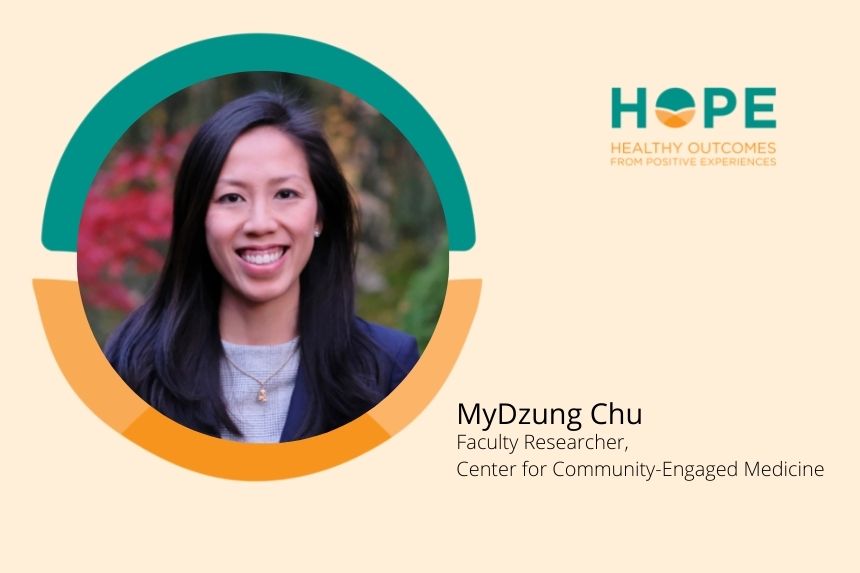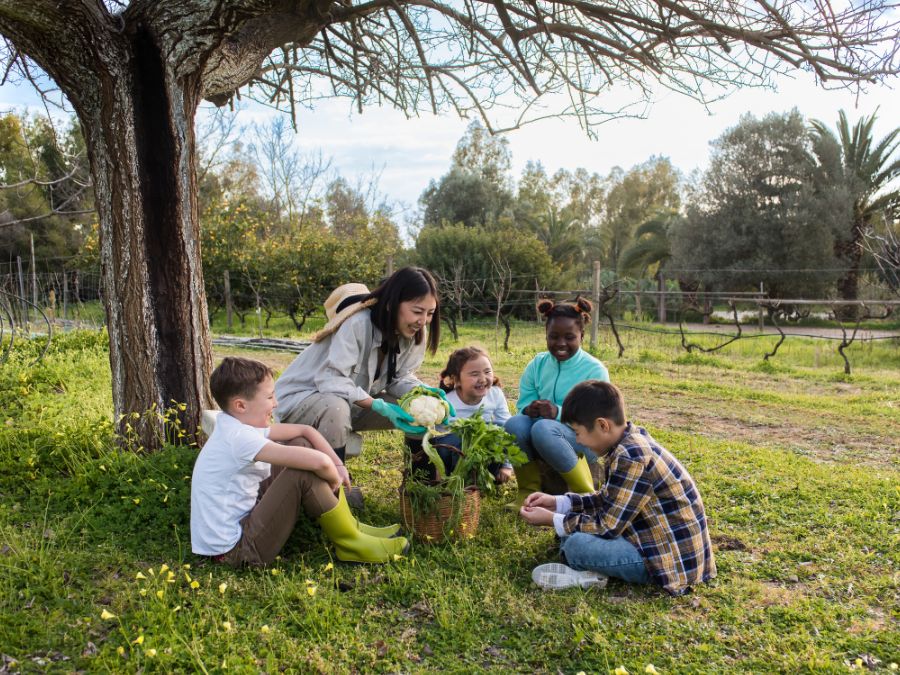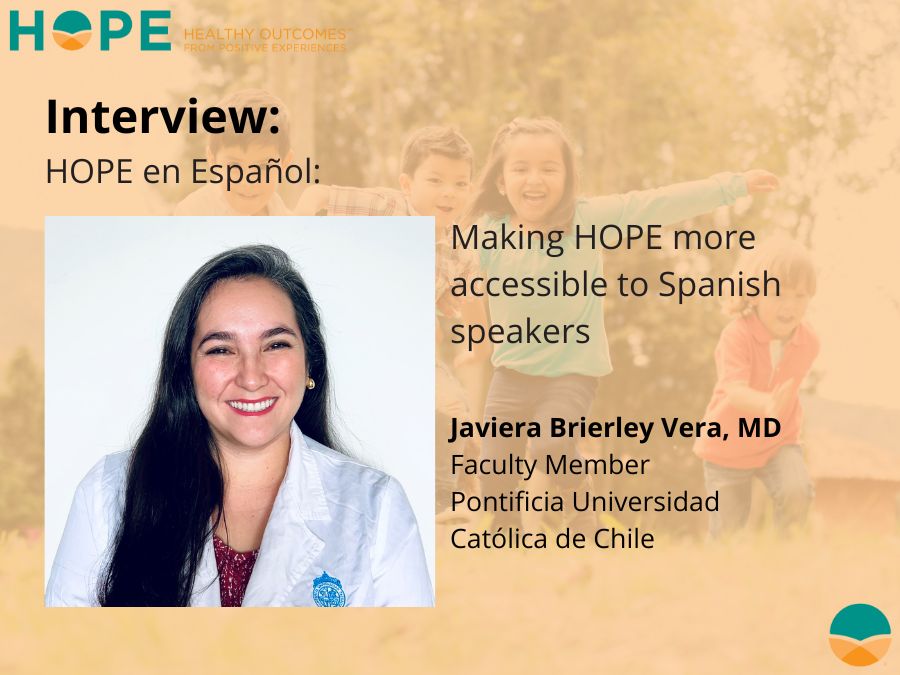
Meet MyDzung Chu, our newest faculty member at the Center for Community Engaged Medicine, working alongside the HOPE team! She shares how she first heard about HOPE and the projects she will be working on with the team.
Can you tell us about your role at Tufts Medical Center?
Hi everyone. I am an environmental and occupational epidemiologist. I am also a first-generation Vietnamese American and native of Springfield, MA. I joined Tufts Medical Center last month as a Faculty Researcher in the Center for Community-Engaged Medicine, an Assistant Professor at Tufts University School of Medicine, and the new Director of ADAPT (Addressing Disparities in Asian Populations through Translational research). ADAPT is a community-academic coalition at the Tufts Clinical and Translational Science Institute (CTSI).
How did you hear about HOPE?
I heard about HOPE because of an exciting collaboration with Dr. Robert Sege, Dr. Dina Burstein and Dr. Allison Stephens. We are adding HOPE to the medical school education by tying it to Community Service Learning. Specifically, we are teaching medical students how to focus on strengths when they see children and families for care. Tufts has a long history and a large footprint in Boston’s Chinatown, where the majority of residents are Asian immigrants (primarily Chinese). As such, the project team is working closely with two of ADAPT’s community leaders, Ben Hires, Chief Executive Officer of the Boston Chinatown Neighborhood Center (BCNC) and Chien-Chi Huang, founder and Executive Director of Asian Women for Health. Both leaders have provided important cultural information and local context. They also have given us examples of how their organizations’ work in the Asian American community to address the Four Building Blocks of HOPE.
You mentioned that you are the Director for ADAPT. What is ADAPT? How have you worked in ADAPT so far?
Within ADAPT, I have enjoyed getting to know our community and academic partners. All of them are advancing the health, well-being, and vitality of Asian American communities throughout Massachusetts. ADAPT started in 2011 with a mission to build authentic community-academic partnerships. In the partnership, historically underserved Asian communities identify their own priorities. Then, ADAPT works with the communities to promote health and well-being through research, education, and advocacy. Our vision is to create healthy and thriving Asian communities where everyone has individual, social, economic, and environmental resources to lead healthy lives. Over the last eleven years, ADAPT has built trust and meaningful partnerships in Boston’s Chinatown. This includes 15 research projects addressing community concerns like housing insecurity, gentrification, and problem gambling. In the coming years, ADAPT will address mental health, data equity, language access, and other structural and social drivers of health that impact Asian American communities statewide.
Do you have other program or research interests?
In addition, I am interested in community-engaged research that advances environmental justice and health equity in housing and neighborhood conditions for Asian American and immigrant communities. Previously as a Postdoctoral Scientist at the George Washington University, I examined the impact of federal housing assistance on blood lead levels among low-income communities. I also developed a national, multidimensional Housing and Environmental Quality Index that can monitor and evaluate different housing quality and environmental health risks over time. Currently, I am working on a pilot to look at how cultural changes, social risks, and environmental risks affect the gut microbiome during pregnancy. Our focus is women who are Chinese, and foreign-born. These studies result in creative approaches to address both social and environmental health disparities. We also learn about the effects of protective factors, like affordable housing assistance, on health. Outside of work, over the past several years, I connect with community groups and residents to organize for affordable housing and equitable community development in Boston.
Tell us about some of your future projects.
Building on this work, I am excited to work with community partners to explore two new projects. The first is looking at the delays and complexities in the processes for accessing affordable housing, i.e. administrative burdens, and their impact on health. The second is to better understand the role of immigrant enclaves and community resilience factors on the health of residents.
Who are you as a person? What activities do you enjoy?
On a personal note, I am a parent of an active and curious 16 month-old. I enjoy watching the world through her eyes and spending much time outdoors on walks and at the lake near our house. Other weekly joys include buying warm delicious pastries from Ms. Lien at the Hing Shing Pastry shop as I commute into Boston’s Chinatown and catching up with friends. And, if anyone is craving ramen, I highly recommend visiting Sakura Sunakku in Chinatown.
MyDzung has a PhD in Population Health Sciences from Harvard University and a MSPH in Environmental-Occupational Health and Epidemiology from Emory University. She also holds a BA in Neuroscience from Smith College. MyDzung serves on the Board of the Healthy Building Network, is a former Agents of Change in Environmental Justice Fellow, and is a former Gates Millennium Scholar. Early in her career, she worked as an epidemiologist with the Massachusetts Department of Public Health and as an ORISE Environmental Health Fellow with the Centers for Disease Control and Prevention/Agency for Toxic Substances and Disease Registry. You can connect with her by email (mchu1@tuftsmedicalcenter) or through LinkedIn and twitter @mydz_C.
Photo by Rendy Novantino on Unsplash


